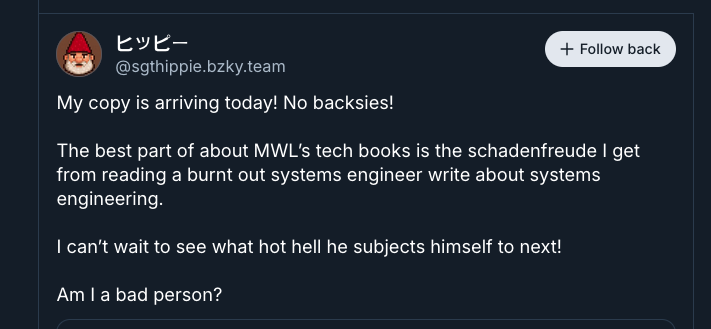The headline says most of it, but:
The new edition of Networking for System Administrators is out. Most stores should have it now. Apple is being a pain, but that’s pretty usual. I’ll fill in missing stores over the next few days, as the databases finish churning.
You might notice that it’s not in Amazon’s Kindle store. Why is that?
Oh, wait. Let me put that in SEO format.
Why is Networking for System Administrators not in Amazon’s Kindle Store?
There. That’ll do. The short answer is for the same reasons that Run Your Own Mail Server and OpenBSD Mastery: Filesystems aren’t, but on the off chance a search engine actually brings someone here, I’ll spell it out.
You can get Kindle-friendly versions of N4SA2e from my store or Gumroad. You can get a Kindle-friendly ebook from any number of other retailers, but while they’re all supposed to be DRM-free I can’t advise on prying the file out of another vendor’s ecosystem. The one place you cannot buy it for Kindle is Amazon’s Kindle bookstore.
TLDR: Amazon pays roughly 70% of retail price for books priced up to $9.99, and 35% for books $10 and over. Amazon is the only retailer that does this. Other retailers, I make somewhere around 65%-70% no matter the retail price. Everything follows from that math, but if you want the details read on.
According to economists, prices have gone up about 40% since I started releasing the Mastery books. According to my wallet, not so much. In 2012 my wife and I could get an inexpensive lunch for $10. Today, no. But let’s go with the official numbers. Just as “dime novels” now cost $10, I must raise prices. While book pricing is hotly debated, $12.99 is a reasonable price for a short tech book like Networking for System Administrators. (If I followed inflation I would charge $13.99, but I’m an idiot.)
If I charge $9.99 for this ebook, I make about $7.
If I charge $12.99 for the ebook, I make about $9 everywhere but Amazon. At Amazon, I make $4.50. For me to make that $9 at Amazon, I must charge about $26. I’m fond of the book, but it ain’t worth that! And if I did, giving Amazon a $17 slice of every sale for no reason sticks in my craw.
Charge $26 at Amazon and $11.99 elsewhere? Amazon’s program has a Most Favored Nation clause. They can price match any other major vendor.
Will Amazon change their business because of this? No. Authors are plentiful and of low value. I am not worth Amazon’s time.
Amazon’s business model is based on squeezing prices down, and they play a long game. I expect them to ever raise that $9.99 limit. A novel might sell tens or hundreds of thousands of copies. If I’m lucky, a book like Networking for System Administrators might sell eight thousand over the next ten years. The few extra bucks I’ll make by raising prices are important. That’s also why I’ve focused so hard on disintermediation through my Patronizers, sponsorships, and Kickstarter.
I have expected this for years. I do not expect to publish future Mastery books on Amazon’s Kindle store, unless by some chance I write another very short one.






